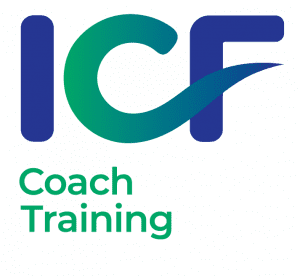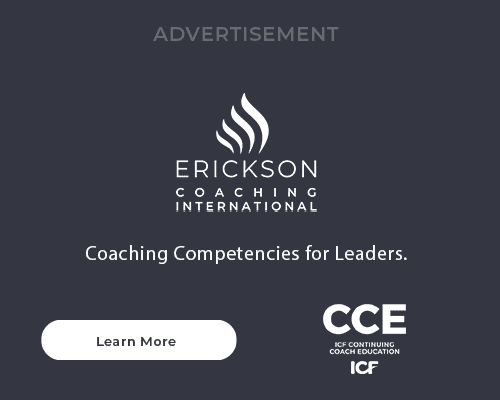Introducing One ICF | ICF Coach Training
The International Coaching Federation (ICF) has taken a bold step forward into the future of coaching. A refreshed brand identity now reflects ICF’s interests in many areas of the coaching industry, represented by six unique family organizations that make the whole or “One” ICF.
First, ICF’s CEO Magdalena Mook introduced the new brand for the entire ICF ecosystem. Then, we interviewed the vice presidents of ICF Professional Coaches and ICF Credentials and Standards to introduce us to their respective family organizations.
Now, part four of the seven-part series continues with the ICF Coach Training family organization. Coaching World interviewed ICF Coach Training Vice President Luke Davis to bring you insights and inspiration as ICF forges ahead and empowers the world through coaching.
Q: Coach training has long been a key component of ICF. What are a few of the most important things your team does?
A: My team is responsible for two things. The first part that my team is responsible for is overseeing the program accreditation side of the house. And that’s any new Accredited Coach Training Program (ACTP), Approved Coach-Specific Training Hours (ACSTH) or Continuing Coach Education (CCE) program accreditation applications, as well as managing our existing training partners who fall into one of those three categories. Essentially, we are the premiere global accrediting body for coach-specific training. We’re looking at curriculum and making sure it’s up to date with the ICF Core Competencies and in line with the global standards we have on adult learning and things like that.
In addition to that, we are also responsible for creating and maintaining a community of coach trainers or coach educators and giving them a space to network and collaborate together. Something exciting that’s happening for us in 2021 is that we’re launching a Coach Trainer Community of Practice where they’ll be able to share leading practices in coach training and coach education globally.
Q: With this new brand identity, tell us about what it means for the ICF Coach Training family organization.
A: It’s a really exciting time for all of ICF. The family organizations were created only a year ago – they came into existence at the beginning of 2020. And it took us that first year to really get up to speed and get organized. This transition provided each of the six family organizations with their own board and resources to be able to accomplish things we need to do and also to look toward the future.
The brand identity is so exciting because it finally gives ICF Coach Training a mark of its own. It gets its own digital and print identity in correlation with the other family organizations and ICF as a whole. So, it’s really exciting for us to have this unique but comparable identity across the whole ICF ecosystem.
Q: Overall, why is this new brand important and how does it reflect ICF’s work in the coaching industry?
A: Launching a new brand is very important because as anyone will tell you, over time, the brand of a company, organization, product, etc., has to evolve. And in the past 25 years of ICF, that brand evolution has taken place a little bit. What’s so exciting about this new brand is that it really catapults us into the future. Just the forward motion of the “C” in the logo really inspires us to look at the next 25 years and what can be accomplished through the coaching profession. It really couldn’t have come at a better time because it puts ICF, ICF Coach Training and the other family organizations at a great place to continue moving forward.
Q: For ICF-accredited coach training programs or those seeking ICF accreditation, how does these changes add value to their work?
A: This is one of the things that’s so exciting because not only did we get a general brand refresh, but we’ve also updated our program accreditation logos, which includes ACTP, ACSTH and CCE program accreditations. And what really adds value here is that each program accreditation has its own mark that’s been updated to match the ICF Coach Training family organization, as well as flow into the overall ICF ecosystem.
For the first time, students who are interested in coach training or those individuals who are seeking coach-specific training – whether to become a professional coach or using it with an internal organization, or they’re a manager or leader using coaching skills – they’re able to look at those designations and see the new brand seamlessly integrates with the ICF Coach Training family organization as well as the whole ICF ecosystem.
What I hope training providers will see is that our brand now really sticks out and catches consumers’ eyes for how they select training and where they go to get training.
Q: Thinking about the value for ICF-Credentialed Coaches, how does this new brand identity add value for those individuals who have gone through that rigorous coach training to earn their credential?
A: With any accreditation, we consider ourselves the global and premiere gold standard for coach training and coach-specific training. So, if a program has been accredited by ICF Coach Training, it has met those rigorous standards. And the future for us is really educating consumers and future students to look for this particular logo to make sure that a program is accredited by ICF. It means we know that the program is the best of the best out there and that it has gone through that quality assurance and control process by our staff to make sure the curriculum is talking about the ICF Core Competencies and that students – and hopefully eventual ICF-Credential holders – are getting a really rich and generous coach-specific training.
Q: What excites you the most about ICF’s new brand identity?
A: The organization is young, and the coaching profession is evolving. We’ve had 25 years of experience now to look back on and what’s most exciting is that we really have taken a bold approach to our brand identity. The colors we’ve chosen are intentional, the words we use to describe each family organization are very specific, and even how we’ve incorporated our mindset of looking forward with the movement of the “C” through the “F” of the logo. It’s exciting for us in ICF Coach Training to have our own unique identity for the first time, and I think that’s what you’ll hear from a lot of the family organizations. Any time we’re working in these complex matrixed organizations – which ICF is now – it’s about having our own identity but knowing that we’re a part of One ICF, one ecosystem that all moves forward together as we work simultaneously on many different projects, initiatives and looking toward the future.
Q: What do you hope this renewed structure and visual identity will inspire for ICF-accredited training providers and the larger coaching community?
A: When you think of “the” ICF as we often hear it referred to across the globe, or “One” ICF, we’re talking about an ecosystem where we now have seven independent parts that are working together – six family organizations and the overall ICF. For example, ICF Coach Training is imperative to be able to work with ICF Credentials and Standards – without training, we can’t award credentials. Without the ICF Foundation, we can’t effectively talk about social change in our industry. Without ICF Professional Coaches, we don’t have students to train in ICF-accredited training programs who then become professional coaches.
It’s about having this ecosystem with all these parts, but that then comes together in this perfect unison of leveraging each other’s strengths; creating economies of scale; and creating collaborative partnerships to be able to engage and talk about what the future looks like, what the current world of coach training or professional coaches or coaching in organizations looks like and how can we utilize each other to talk about that vision and mission, about what we want to accomplish.
I hope that coach trainers, coach educators, professional coaches, credential-holders, foundation donors, those in the thought leadership group who are reimagining and challenging the coaching profession and what we do, as well as internal coaches and internal coaching programs are really looking at this new structure and thinking “wow” – all of these groups are working together, all collaborating for the future of the profession.
Q: What branding and aesthetic changes do you think the ICF community will be most excited to see?
A: When the designs were initially revealed, we got to see that ICF is taking on a bold vision aesthetically and branding-wise for the future. We’ve been intentional about the colors we’ve used, about the words associated with the brand and that each family organization has its own brand identity for the first time. And so, I hope the community sees the intention, care and thought the ICF Marketing and Communications team, along with the stakeholders and the whole ICF community, has really put into this. I think it’s a bold new direction for us, and I’m very excited about where we’re going.
Q: Do you have anything else to add?
A: A lot of coach practitioners and others across our system may think, “How do I interact with ICF Coach Training? What else does that family organization do?” We’re looking forward to collaborating across the system for anyone interested in getting a coach-specific training program accredited or in meeting those global ICF standards of educating future students. We’re happy to have a conversation with anyone across the ecosystem, and we’re really thankful for our current accrediting partners and new partners who will be applying in the future. We’re excited to be able to partake in that process with you and are excited about working with all of our programs to move the needle forward in the coaching profession.



 Luke Davis currently serves as the Vice President of ICF Coach Training and is responsible for the organization’s overall leadership, management, and strategy. Additionally, he is responsible for board development and management, and works directly with the ICF Coach Training Board of Directors for the advancement of coach training and program accreditation.
Luke Davis currently serves as the Vice President of ICF Coach Training and is responsible for the organization’s overall leadership, management, and strategy. Additionally, he is responsible for board development and management, and works directly with the ICF Coach Training Board of Directors for the advancement of coach training and program accreditation.
Super work ICF Team. Thank you for all the updates and innovative thinking. It really adds value to my accreditation and membership.